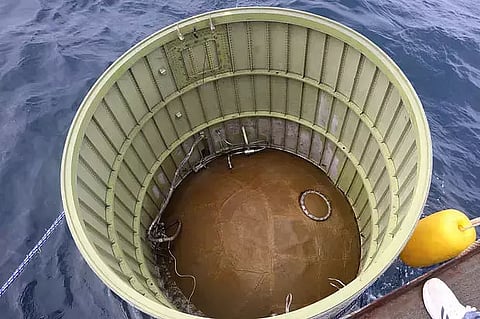
- Home
- Live Blog
- Breaking News
- Top Headlines
- Cities
- NE News
- Sentinel Media
- Sports
- Education
- Jobs

SEOUL: Even as North Korea continues to be mired in growing tensions with South Korea and the United States, the communist country’s attempt to put the country's first 'spy satellite' in space failed and it fell into the water on Wednesday.
This failure is expected to deliver a big blow to North Korean leader Kim Jong Un's attempt to boost his military capabilities, according to reports.
Pyongyang (N Korea) had announced earlier that it planned to launch what it termed “military reconnaissance satellite No. 1” by June 11.
The Malligyong-1 satellite was being carried by the newly developed Chollima-1 rocket, which was launched from the North's Sohae Satellite Launching Ground, situated in the northwest of the country, at 6:37 am. After it lost thrust, following the separation of its first and second stages, the rocket was reported to have crashed off the Korean Peninsula's western coast.
However, after coming to know what went wrong with its rocket liftoff, North Korea pledged to conduct a second launch, in what is being regarded as an unusually fast acknowledgement of failure.
According to news reports emerging from the , the country's space agency will investigate defects revealed in the launch, take urgent measures to overcome them and conduct the second launch as soon as possible through various part tests.
The launch of the rocket had set off emergency warnings on the southern Japanese island of Okinawa and in the South Korean capital Seoul, where the city even resorted to briefly issuing an evacuation warning.
South Korea's military stated military readiness was boosted in coordination with the United States, while Japan said it had been prepared to respond to any emergency. After the launch, South Korea and Japan briefly advised locals to seek shelter. However, alerts in both the countries were later lifted.
Seoul’s military said "an abnormal flight" was recorded by the North Korean rocket before it fell into the water. ‘No object was believed to have reached space’, Japan's Chief Cabinet Secretary Hirokazu Matsuno reportedly told the media.
Moreover, the South Korean military divulged that it had retrieved an object believed to be part of the crashed North Korean rocket, in sea waters almost 200 kms west of Eocheongdo, a southwestern island. Photos of a white, metal cylinder, described to be a suspected rocket part, were also released by the Defense Ministry.
Also Watch: